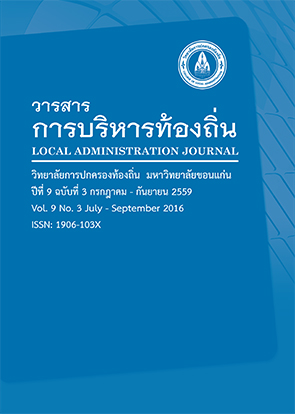นโยบายการจัดการที่ดินและป่าไม้ของรัฐกับศักยภาพการเปลี่ยนแปลงนโยบาย โดยชุมชนท้องถิ่น ศึกษากรณีชุมชนท้องถิ่นในเขตรักษาพันธุ์สัตว์ป่า ตำบลโมโกร อำเภออุ้มผาง จังหวัดตาก
Keywords:
นโยบายสาธารณะ, ศักยภาพของชุมชน, การเปลี่ยนแปลงนโยบาย, Public policy, Community’s potentiality, Changing policyAbstract
การวิจัยนี้มีวัตถุประสงค์เพื่อ ศึกษากระบวนการกำหนดนโยบายการจัดการที่ดินและป่าไม้ของรัฐโดยอาศัยทฤษฎีความขัดแย้งของ ราล์ฟ ดาห์เรนดอร์ฟ เป็นกรอบในการวิเคราะห์ และศึกษาการก่อรูปนโยบายใหม่รวมถึงศักยภาพของชาวชุมชนท้องถิ่นในการเปลี่ยนแปลงนโยบาย โดยพิจารณาจากการสร้างกลุ่มผล ประโยชน์ทางสังคม ระดับความรุนแรงและความเข้มข้นของความขัดแย้งอันเป็นผลจากการดำเนินนโยบายจัดการที่ดินและป่าไม้ของภาครัฐ
การศึกษาวิจัยนี้เป็นการวิจัยเชิงคุณภาพ โดยใช้ข้อมูลจากเอกสารและคำสัมภาษณ์ที่ได้จากประชากรตัวอย่าง คือ ผู้นำชุมชนท้องถิ่นประกอบด้วย กำนัน ผู้ใหญ่บ้าน ผู้ช่วยฯ สมาชิกองค์การบริหารส่วนตำบล และคณะกรรมการหมู่บ้าน ของหมู่บ้านแม่กลองคี หมู่บ้านแม่กลองใหญ่ และหมู่บ้านแม่กลองน้อย มีแบบสัมภาษณ์กลุ่มเป็นเครื่องมือในการวิจัย เก็บข้อมูลโดยการสัมภาษณ์กลุ่ม ซึ่งจัดให้มีขึ้นในวันที่ 9-11 สิงหาคม พ.ศ. 2558
ผลการวิเคราะห์พบว่าการประกาศเขตรักษาพันธุ์สัตว์ป่าอุ้มผาง เป็นการกำหนดนโยบายเพื่อปกป้องคุ้มครองผลประโยชน์ หรือคุณค่าเป้าหมายของรัฐ และกีดกันการเข้าถึงทรัพยากรที่ดินของชาวชุมชนท้องถิ่น จึงก่อให้เกิดความขัดแย้งขึ้น และผลการศึกษาพบว่า ชุมชนท้องถิ่นมีศักยภาพต่ำในการผลักดันให้เกิดการเปลี่ยนแปลงนโยบายของรัฐได้ เพราะไม่มีการตั้งเป็นกลุ่มผลประโยชน์ที่ชัดเจน อีกทั้งระดับความรุนแรงของความขัดแย้งยังต่ำจึงไม่หนุนให้เกิดการเปลี่ยนแปลงเชิงนโยบายอย่างรวดเร็ว แม้ระดับความเข้มข้นของความขัดแย้งจะปรากฏให้เห็นในระดับหนึ่งแต่ไม่เข้มข้นจนสามารถกลายเป็นพลังที่จะสร้างการเปลี่ยนแปลงได้อย่างลึกซึ้ง ดังนั้นผู้วิจัยมีข้อเสนอแนะว่าชาวบ้านท้องถิ่นต้องจัดตั้งกลุ่มเป็นองค์กรเชิงสถาบันที่มีแนวคิดอุดมการณ์ และผลประโยชน์ที่ชัดเจนให้ได้ อีกทั้งกำกับระดับความรุนแรงและความเข้มข้นของความขัดแย้งผ่านกิจกรรมต่าง ๆ ที่องค์กรจัดขึ้นอย่างสร้างสรรค์
Government Land and Forest Management Policy and a Local Community’s Potential to Amend Policy: A Case of the Communities in the Wildlife Sanctuary at Mogro Subdistrict, Umphang District,Tak Province
The objectives of this research were: 1) to study the process of government land and forest management policy formulation, using Ralph Dahrendorf’s conflict theory as the analytical framework, and 2) to assess the potential of the local communities to create social pressure on the government to amend policy, considering the existing interest groups and the level of intensity of social conflicts.
The design of this research was qualitative, using descriptive analysis of documents and data from the interviews of a group of purposively selected community leaders, village headmen, assistant village headmen, members of the Subdistrict Administrative Organization and village committees of Mae Klong Kee, Mae Klong Yai, and Mae Klong Noi villages. The group interviews were conducted during August 9 -11, 2015.
The results of this study show that the classification of Umphang forest area as a Wildlife Sanctuary, which was done in order to protect the interest of the state, limits the accessibility and the use of land resources for the local communities, resulting in social conflicts. This research also indicates that local people in the area have low potential to push for an amendment of this government policy. As found in this research, local people are unable to unite among themselves to protect their own interests. In addition, the level of conflict between the villagers and the government has not intensified to the level that warrants attention from the government. It is therefore suggested that local residents need to be firmly united to protect their common interests with a clear ideology and together create an institutional organization. To pressure for amendment of the current policy, the villagers have to regulate and intensify the level of conflict through positive social activities under the aegis of the institutional organization they have formed.
Downloads
Published
How to Cite
Issue
Section
License
The copyright of all articles published in the Local Administration Journalis owned by the College of Local Administration, Khon Kaen University.



